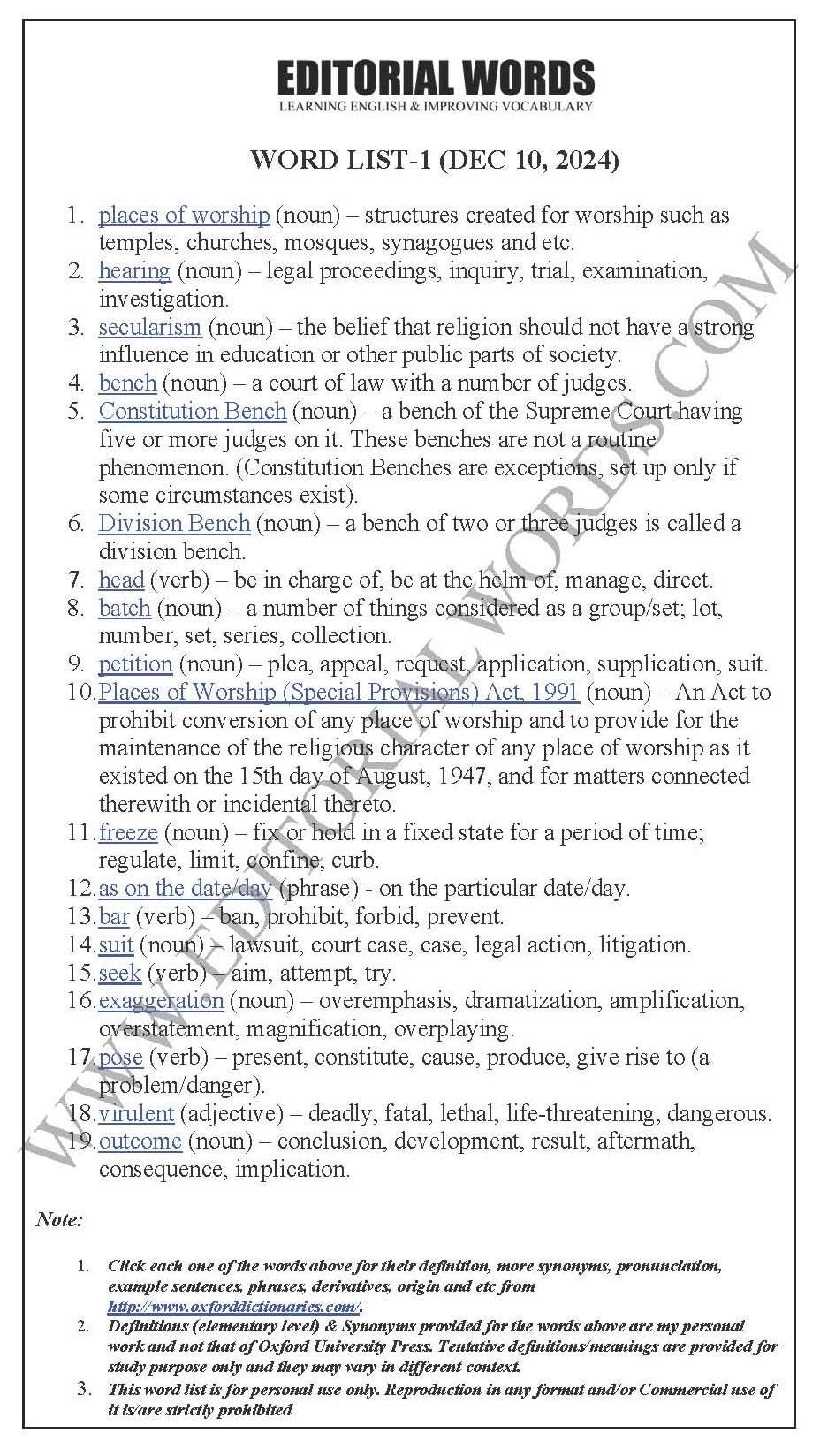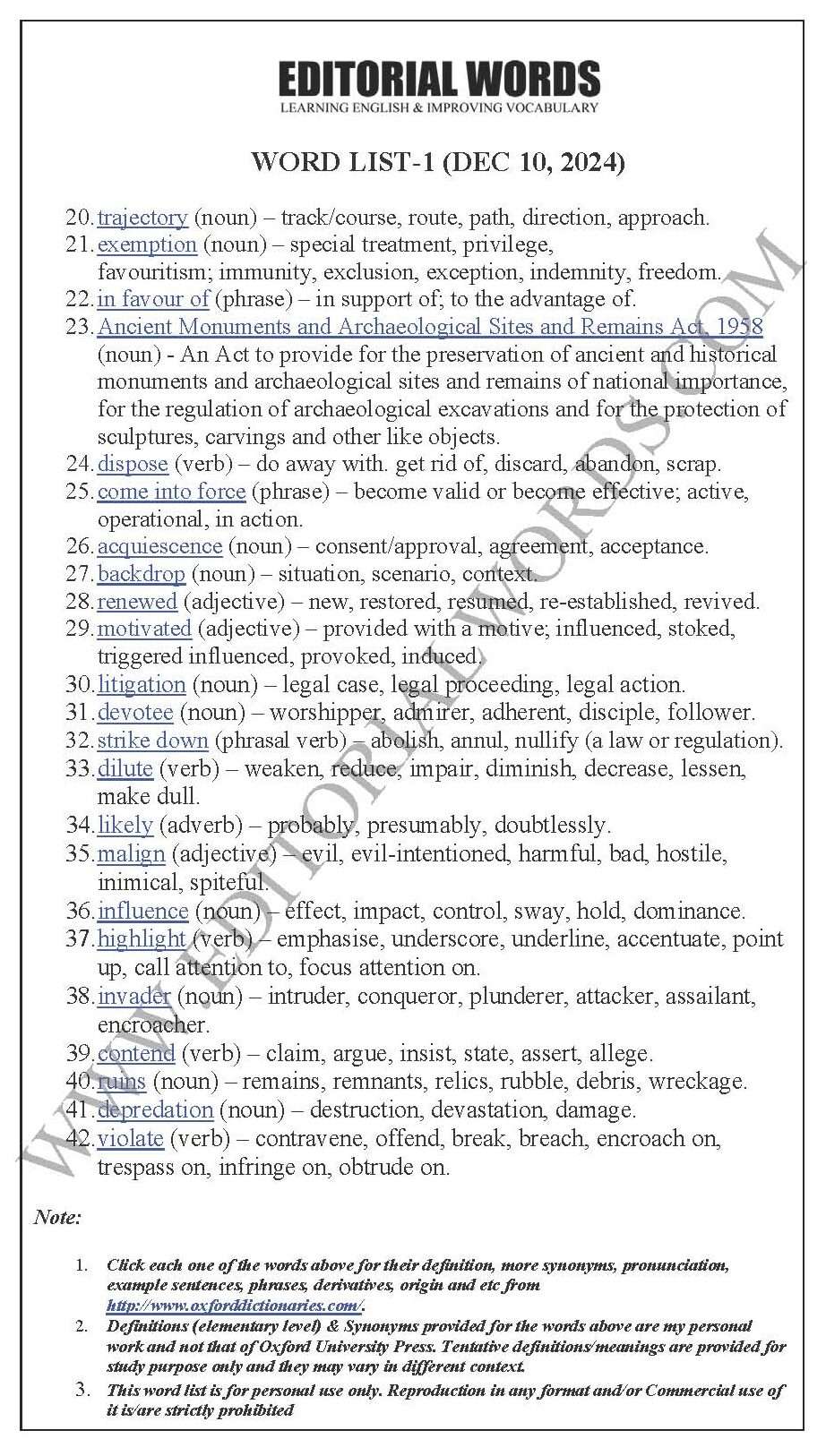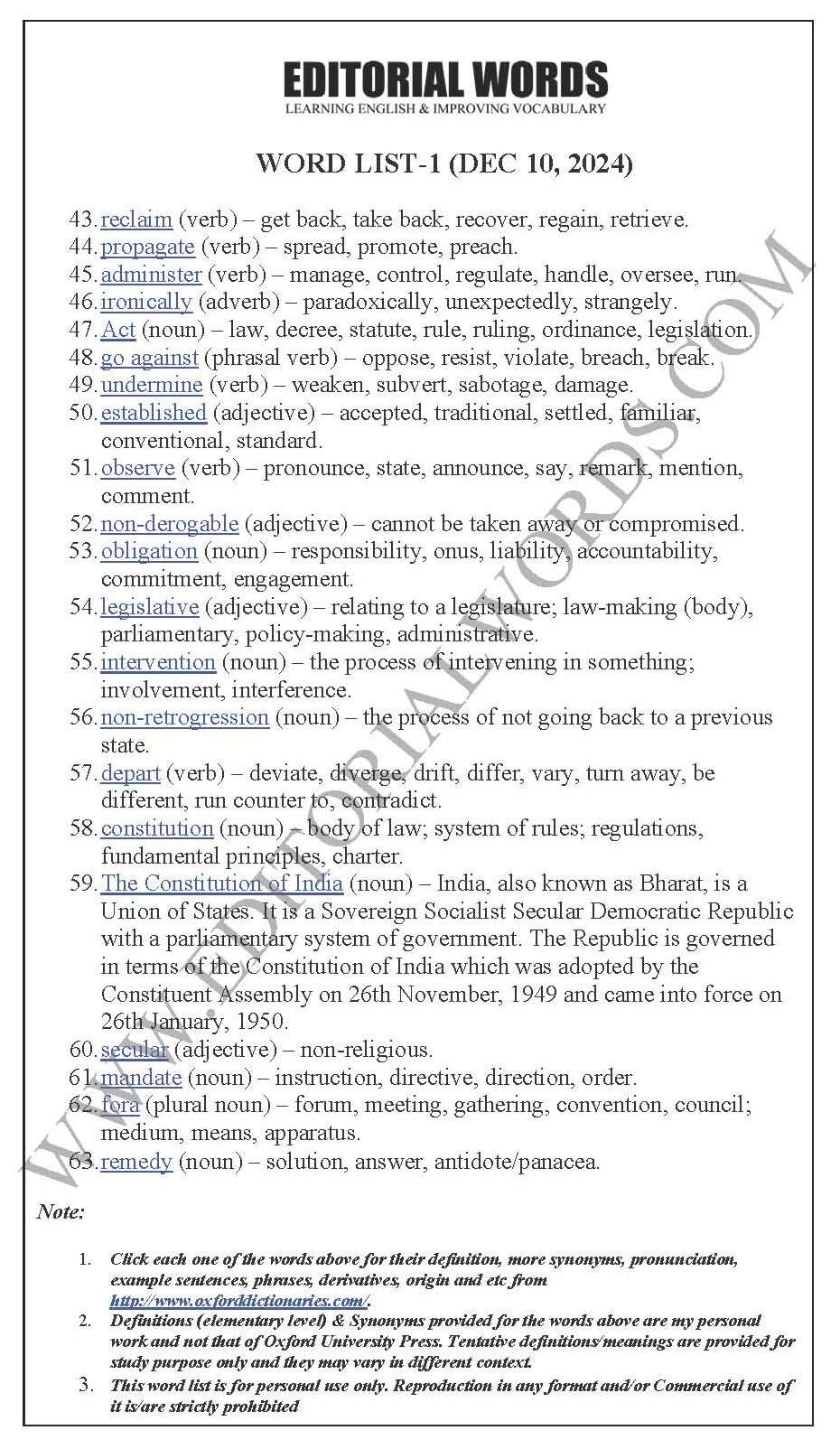The Hindu Editorial (Places and worship) – Dec 10, 2024
To read this article, click “The Hindu”.
This preview is provided here with permission.
Courtesy: The Hindu
The Hindu Editorial (Places and worship) – Dec 10, 2024:
- places of worship (noun) – structures created for worship such as temples, churches, mosques, synagogues and etc.
- hearing (noun) – legal proceedings, inquiry, trial, examination, investigation.
- secularism (noun) – the belief that religion should not have a strong influence in education or other public parts of society.
- bench (noun) – a court of law with a number of judges.
- Constitution Bench (noun) – a bench of the Supreme Court having five or more judges on it. These benches are not a routine phenomenon. (Constitution Benches are exceptions, set up only if some circumstances exist).
- Division Bench (noun) – a bench of two or three judges is called a division bench.
- head (verb) – be in charge of, be at the helm of, manage, direct.
- batch (noun) – a number of things considered as a group/set; lot, number, set, series, collection.
- petition (noun) – plea, appeal, request, application, supplication, suit.
- Places of Worship (Special Provisions) Act, 1991 (noun) – An Act to prohibit conversion of any place of worship and to provide for the maintenance of the religious character of any place of worship as it existed on the 15th day of August, 1947, and for matters connected therewith or incidental thereto.
- freeze (noun) – fix or hold in a fixed state for a period of time; regulate, limit, confine, curb.
- as on the date/day (phrase) – on the particular date/day.
- bar (verb) – ban, prohibit, forbid, prevent.
- suit (noun) – lawsuit, court case, case, legal action, litigation.
- seek (verb) – aim, attempt, try.
- exaggeration (noun) – overemphasis, dramatization, amplification, overstatement, magnification, overplaying.
- pose (verb) – present, constitute, cause, produce, give rise to (a problem/danger).
- virulent (adjective) – deadly, fatal, lethal, life-threatening, dangerous.
- outcome (noun) – conclusion, development, result, aftermath, consequence, implication.
- trajectory (noun) – track/course, route, path, direction, approach.
- exemption (noun) – special treatment, privilege, favouritism; immunity, exclusion, exception, indemnity, freedom.
- in favour of (phrase) – in support of; to the advantage of.
- Ancient Monuments and Archaeological Sites and Remains Act, 1958 (noun) – An Act to provide for the preservation of ancient and historical monuments and archaeological sites and remains of national importance, for the regulation of archaeological excavations and for the protection of sculptures, carvings and other like objects.
- dispose (verb) – do away with. get rid of, discard, abandon, scrap.
- come into force (phrase) – become valid or become effective; active, operational, in action.
- acquiescence (noun) – consent/approval, agreement, acceptance.
- backdrop (noun) – situation, scenario, context.
- renewed (adjective) – new, restored, resumed, re-established, revived.
- motivated (adjective) – provided with a motive; influenced, stoked, triggered influenced, provoked, induced.
- litigation (noun) – legal case, legal proceeding, legal action.
- devotee (noun) – worshipper, admirer, adherent, disciple, follower.
- strike down (phrasal verb) – abolish, annul, nullify (a law or regulation).
- dilute (verb) – weaken, reduce, impair, diminish, decrease, lessen, make dull.
- likely (adverb) – probably, presumably, doubtlessly.
- malign (adjective) – evil, evil-intentioned, harmful, bad, hostile, inimical, spiteful.
- influence (noun) – effect, impact, control, sway, hold, dominance.
- highlight (verb) – emphasise, underscore, underline, accentuate, point up, call attention to, focus attention on.
- invader (noun) – intruder, conqueror, plunderer, attacker, assailant, encroacher.
- contend (verb) – claim, argue, insist, state, assert, allege.
- ruins (noun) – remains, remnants, relics, rubble, debris, wreckage.
- depredation (noun) – destruction, devastation, damage.
- violate (verb) – contravene, offend, break, breach, encroach on, trespass on, infringe on, obtrude on.
- reclaim (verb) – get back, take back, recover, regain, retrieve.
- propagate (verb) – spread, promote, preach.
- administer (verb) – manage, control, regulate, handle, oversee, run.
- ironically (adverb) – paradoxically, unexpectedly, strangely.
- Act (noun) – law, decree, statute, rule, ruling, ordinance, legislation.
- go against (phrasal verb) – oppose, resist, violate, breach, break.
- undermine (verb) – weaken, subvert, sabotage, damage.
- established (adjective) – accepted, traditional, settled, familiar, conventional, standard.
- observe (verb) – pronounce, state, announce, say, remark, mention, comment.
- non-derogable (adjective) – cannot be taken away or compromised.
- obligation (noun) – responsibility, onus, liability, accountability, commitment, engagement.
- legislative (adjective) – relating to a legislature; law-making (body), parliamentary, policy-making, administrative.
- intervention (noun) – the process of intervening in something; involvement, interference.
- non-retrogression (noun) – the process of not going back to a previous state.
- depart (verb) – deviate, diverge, drift, differ, vary, turn away, be different, run counter to, contradict.
- constitution (noun) – body of law; system of rules; regulations, fundamental principles, charter.
- The Constitution of India (noun) – India, also known as Bharat, is a Union of States. It is a Sovereign Socialist Secular Democratic Republic with a parliamentary system of government. The Republic is governed in terms of the Constitution of India which was adopted by the Constituent Assembly on 26th November, 1949 and came into force on 26th January, 1950.
- secular (adjective) – non-religious.
- mandate (noun) – instruction, directive, direction, order.
- fora (plural noun) – forum, meeting, gathering, convention, council; medium, means, apparatus.
- remedy (noun) – solution, answer, antidote/panacea.
Note :
1. Click each one of the words above for their definition, more synonyms, pronunciation, example sentences, phrases, derivatives, origin and etc. from http://www.oxforddictionaries.com/.
2. Definitions (elementary level) & Synonyms provided for the words above are my personal work and not that of Oxford University Press. Tentative definitions/meanings are provided for study purposes only and they may vary in a different context.
3. This word list is for personal use only. Reproduction in any format and/or Commercial use of it is/are strictly prohibited.
The Hindu Editorial (Places and worship) – Dec 10, 2024:



“Idioms & Phrases” We Learnt Last Week
“Important Definitions” We Learnt Last Week
Recent Word Lists For The Hindu Editorial Articles

A special Bench of the Supreme Court of India, headed by Chief Justice of India Sanjiv Khanna, will begin hearing on December 12 a batch of petitions that question the validity of the Places of Worship (Special Provisions) Act, 1991,… For further reading, visit “The Hindu”. Below is today’s word list-1 for The Hindu Editorial (Places and worship) – Dec 10, 2024.